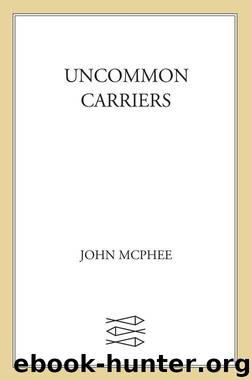Uncommon Carriers by John McPhee

Author:John McPhee
Language: eng
Format: mobi, epub
Publisher: Farrar, Straus and Giroux
Published: 2006-05-15T14:00:00+00:00
Passing under a pair of high bridges, we came to the mouth of the Nashua River not long after noon. Turning into it, we pulled up the canoe on a sandy beach among boulders, and, under red maples, ate Stonehedge-prepared club sandwiches laced with avocado. The Nashua was clear, smooth, and fast—not white water but a firm current coming down through a railroad bridge whose bowstring trusses enhanced a lovely scene. The Nashua River, near its mouth, bisects the city, flourishing three oxbow bends before debouching into the Merrimack. The Thoreaus, after passing under a covered bridge and arriving at the Nashua, were not much interested. Henry praises the tributary for its “elmshaded meadows” at Groton, but says that “near its mouth it is obstructed by falls and factories, and did not tempt us to explore it.” It tempted Mark and me, and we took off for the public library, digging hard against deceptive currents. A week earlier, for training purposes, we had gone a mile and a half against the upper Delaware at a stage near flood. But this was more difficult, possibly because the Nashua was shallow and we were not poling. Working off the avocado, we got around a meander bend and under the 101 bridge, almost a mile up. Then we came to a small island, beyond which were another railroad bridge and a dam. On our left was the spire of St. Casimir’s Catholic Church, dark-red brick, 1857. St. Casimir’s is on Temple Street near Scripture. Scripture is one-way. On our right was a brick mill, fourteen years old when the Thoreaus went by, with three large arches standing in the river, framing a pitch-black watery cavern. We fought up past the arches to the top of the island, where we decided to let the Nashua return us to the Merrimack.
A two-mile digression is not a rarity in Thoreau. He is, to a fare-thee-well, an author with the courage to digress. In this same reach of the Merrimack, while slicing his midday melons, he mentions that they are “a fruit of the east,” and his thoughts go off, his pencil with them, to “Arabia, Persia, and Hindostan, the lands of contemplation and dwelling-places of the ruminant nations.” He visits a lot of ruminant nations—their faiths, literatures, and philosophies—and returns reliably after a detour of six thousand words. On the Sunday morning that he hauls the dory through the Middlesex Canal, he passes a church, close to the Merrimack, whose congregation pours out as the brothers go by. This triggers five thousand words on comparative religion before the dory is lowered to the river. Had he been a candidate for employment in the pulpit of that church, the congregation might not have been eager to hire him. “Absolutely speaking, Do unto others as you would that they should do unto you is by no means a golden rule, but the best of current silver,” he remarks. Jesus Christ “taught mankind but imperfectly how to live.” “The church is a sort of hospital for men’s souls, and as full of quackery.
Download
This site does not store any files on its server. We only index and link to content provided by other sites. Please contact the content providers to delete copyright contents if any and email us, we'll remove relevant links or contents immediately.
The Rules Do Not Apply by Ariel Levy(4951)
Bluets by Maggie Nelson(4542)
Too Much and Not the Mood by Durga Chew-Bose(4332)
Pre-Suasion: A Revolutionary Way to Influence and Persuade by Robert Cialdini(4213)
The Motorcycle Diaries by Ernesto Che Guevara(4081)
Walking by Henry David Thoreau(3949)
Schaum's Quick Guide to Writing Great Short Stories by Margaret Lucke(3368)
What If This Were Enough? by Heather Havrilesky(3302)
The Daily Stoic by Holiday Ryan & Hanselman Stephen(3297)
The Day I Stopped Drinking Milk by Sudha Murty(3186)
The Social Psychology of Inequality by Unknown(3013)
Why I Write by George Orwell(2944)
Letters From a Stoic by Seneca(2789)
A Short History of Nearly Everything by Bryson Bill(2681)
A Burst of Light by Audre Lorde(2588)
Insomniac City by Bill Hayes(2537)
Feel Free by Zadie Smith(2473)
Upstream by Mary Oliver(2384)
Miami by Joan Didion(2364)
